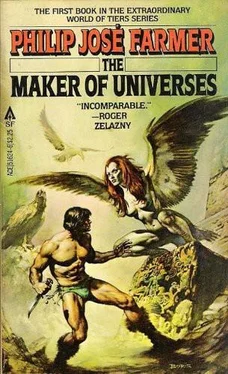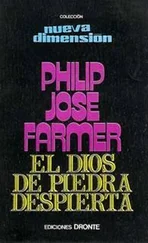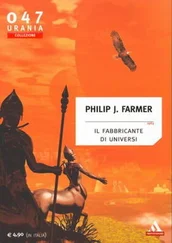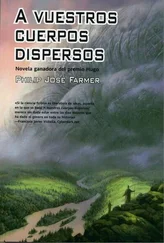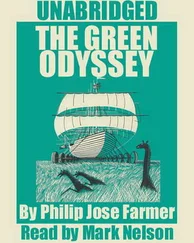“Did you see the horn?” Kickaha said.
“No,” Phthie replied. “But they doubtless have it concealed in one of the skin bags they were carrying. I snatched one of the bags away from a gworl on the chance it might contain the horn. For my troubles, I got a bag full of junk and almost received an arrow through my wing.”
“The gworl have bows?” Wolff asked, surprised.
“No. The rivermen shot at me.”
Wolff, asking about the ravens, was told that there were many. Apparently the Lord must have ordered a number to keep watch on the gworl.
“That’s bad,” Kickaha said. “If they spot us, we’re in real trouble.”
“They don’t know what you look like,” Phthie said. “I’ve eavesdropped on the ravens when they were talking, hiding when I longed to seize them and tear them apart. But I have orders from my mistress, and I obey. The gworl have tried to describe you to the Eyes of the Lord. The ravens are looking for two traveling together, both tall, one black-haired, the other bronze-haired. But that is all they know, and many men conform to that description. The ravens, however, will be watching for two men on the trail of the gworl.”
“I’ll dye my beard, and we’ll get Khamshem clothes,” Kickaha said.
Phthie said that she must be getting on. She had been on her way to report to Podarge, having left another sister to continue the surveillance of the gworl, when she had spied the two. Kickaha thanked her and made sure that she would carry his regards to Podarge. After the giant bird had launched herself from the rim of the monolith, the men went into the jungle.
“Walk softly, speak quietly,” Kickaha said. “Here be tigers. In fact, the jungle’s lousy with them. Here also be the great axebeak. It’s a wingless bird so big and fierce even one of Podarge’s pets would skedaddle away from it. I saw two tigers and an axebeak tangle once, and the tigers didn’t hang around long before they caught on it’d be a good idea to take off fast.”
Despite Kickaha’s warnings, they saw very little life except for a vast number of many-colored birds, monkeys, and mouse-sized antlered beetles. For the beetles, Kickaha had one word: “poisonous.” Thereafter, Wolff took care before bedding down that none were about.
Before reaching their immediate destination, Kickaha looked for a plant, the ghubharash. Locating a group after a half-day’s search, he pounded the fibers, cooked them, and extracted a blackish liquid. With this he stained his hair, beard, and his skin from top to bottom.
“I’ll explain my green eyes with a tale of having a slave-mother from Teutonia,” he said. “Here. Use some yourself. You could stand being a little darker.”
They came to a half-ruined city of stone and wide-mouthed squatting idols. The citizens were a short, thin, and dark people who dressed in maroon capes and black loincloths. Men and women wore their hair long and plastered with butter, which they derived from the milk of piebald goats that leaped from ruin to ruin and fed on the grasses between the cracks in the stone. These people, the Kaidushang, kept cobras in little cages and often took their pets out to fondle. They chewed dhiz, a plant which turned their teeth black and gave their eyes a smoldering look and their motions a slowness.
Kickaha, using H’vaizhum, the pidgin rivertalk, bartered with the elders. He traded a leg of a hippopotamus-like beast he and Wolff had killed for Khamshem garments. The two donned the red and green turbans adorned with kigglibash feathers, sleeveless white shirts, baggy pantaloons of purple, sashes that wound around and around their waists many times, and the black, curling-toed slippers.
Despite their dhiz-stupored minds, the elders were shrewd in their trading. Not until Kickaha brought a very small sapphire from his bag—one of the jewels given him by Podarge—would they sell the pearlencrusted scabbards and the scimitars in their hidden stock.
“I hope a boat comes along soon,” Kickaha said. “Now that they know I have stones, they might try to slit our throats. Sorry, Bob, but we’re going to have to keep watch at night. They also like to send in their snakes to do their dirty work for them.”
That very day, a merchantman sailed around the bend of the river. At sight of the two standing on the rotting pier and waving long white handkerchiefs, the captain ordered the anchor dropped and sails lowered.
Wolff and Kickaha got into the small boat lowered for them and were rowed out to the Khrillquz. This was about forty feet long, low amidships but with towering decks fore and aft, and one fore-and-aft sail and jib. The sailors were mainly of that branch of Khamshem folk called the Shibacub. They spoke a tongue the phonology and structure of which had been described by Kickaha to Wolff. He was sure that it was an archaic form of Semitic influenced by the aboriginal tongues.
The captain, Arkhyurel, greeted them politely on the poopdeck. He sat cross-legged on a pile of cushions and rich rugs and sipped on a tiny cup of thick wine.
Kickaha, calling himself Ishnaqrubel, gave his carefully prepared story. He and his companion, a man under a vow not to speak again until he returned to his wife in the far off land of Shiashtu, had been in the jungle for several years. They had been searching for the fabled lost city of Ziqooant.
The captain’s black and tangled eyebrows rose, and he stroked the dark-brown beard that fell to his waist. He asked them to sit down and to accept a cup of the Akhashtum wine while they told their tale. Kickaha’s eyes shone and he grinned as he plunged into his narration. Wolff did not understand him, yet he was sure that his friend was in raptures with his long, richly detailed, and adventurous lies. He only hoped Kickaha would not get too carried away and arouse the captain’s incredulity.
The hours passed while the caravel sailed down the river. A sailor clad only in a scarlet loincloth, bangs hanging down below his eyes, played softly on a flute on the foredeck. Food was carried to them on silver and gold platters: roasted monkey, stuffed bird, a black hard bread, and a tart jelly. Wolff found the meat too highly spiced, but he ate.
The sun neared its nightly turn around the mountain, and the captain arose. He led them to a little shrine behind the wheel; here was an idol of green jade, Tartartar. The captain chanted a prayer, the prime prayer to the Lord. Then Arkhyurel got down on his knees before the minor god of his own nation and made obeisance. A sailor sprinkled a little incense on the tiny fire glowing in the hollow in Tartartar’s lap. While the fumes spread over the ship, those of the captain’s faith prayed also. Later, the mariners of other gods made their private devotions.
That night, the two lay on the mid-deck on a pile of furs which the captain had furnished them.
“I don’t know about this guy Arkhyurel,” Kickaha said. “I told him we failed to locate the city of Ziqooant but that we did find a small treasure cache. Nothing to brag about but enough to let us live modestly without worry when we return to Shiashtu. He didn’t ask to see the jewels, even though I said I’d give him a big ruby for our passage. These people take their time in their dealings; it’s an insult to rush business. But his greed may overrule his sense of hospitality and business ethics if he thinks he can get a big haul just by cutting our throats and dumping our bodies into the river.”
He stopped for a moment. Cries of many birds came from the branches along the river; now and then a great saurian bellowed from the bank or from the river itself.
“If he’s going to do anything dishonorable, he’ll do it in the next thousand miles. This is a lonely stretch of river; after that, the towns and cities begin to get more numerous.”
Читать дальше
